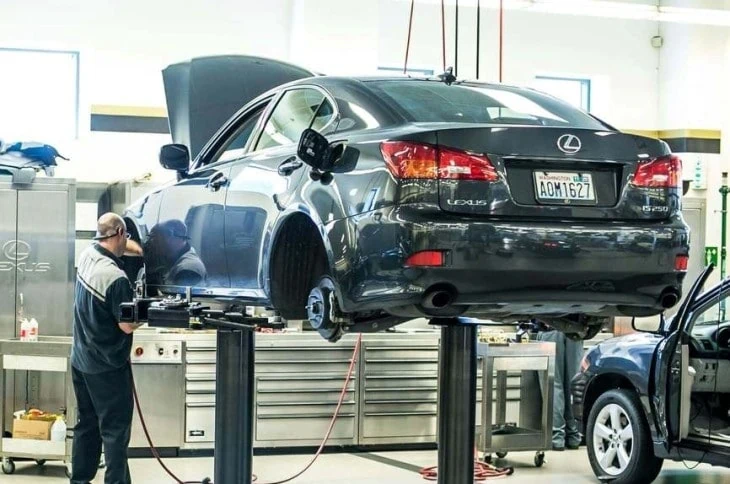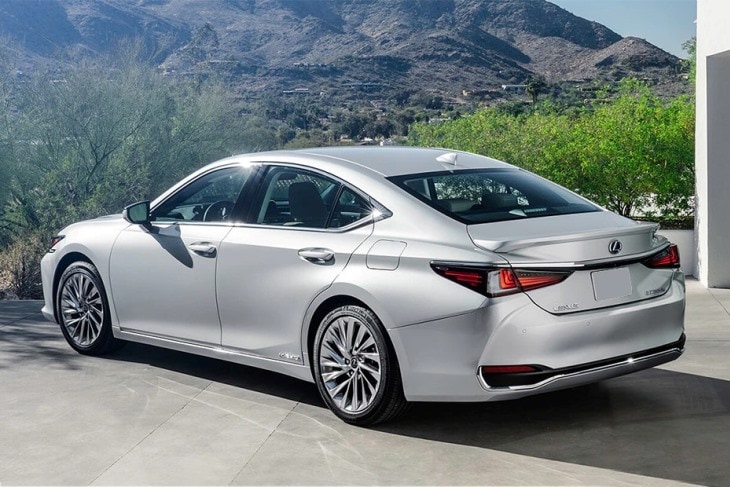As a luxury icon, Lexus’ motto “Experience Amazing” is memorable. These luxury cars are a part of the Toyota family. Of all the foreign luxury car brands, Lexus is considered to be the most reliable in terms of repair and lifespan.
How long do these “amazing” luxury cars run, anyway? What kind of lifespan can you expect from your Lexus? What kind of reliability ratings do they receive? Which model is the most reliable and which is the worst? Let’s find out!
Lexus is a luxury car brand that is made by Toyota. With proper maintenance and care, a Lexus can last 250,000-300,000 miles or 16-20 years. This is much longer than the average of 150,000-200,000 miles or 10-16 years that most vehicles average. Lexus also has a reputation for reliability and low instances of severe repairs.
Table of Contents
- How Many Miles Can a Lexus Last?
- How Many Years Can a Lexus Last?
- Are Lexus Reliable?
- What Are the Most Common Problems with Lexus?
- What Are the Most Reliable Lexus Models?
- What Are the Least Reliable Lexus Model?
- Do Lexus Hold Their Value?
- How Does Lexus Lifespan Compare to Other Vehicles?
- How Can I Make My Lexus Last Longer?
How Many Miles Can a Lexus Last?

Lexus has a solid reputation as a luxury vehicle with exceptional longevity. Just how long can a Lexus keep driving? If properly maintained, a Lexus will last 250,000-300,000 miles. The average vehicle lifespan, across all makes and models, is 150,000-200,000 miles.
How Many Years Can a Lexus Last?
The average vehicle is driven around 15,000 miles per year. Do the math. Lexus’ vehicles should last 16-20 years. The average vehicle across all brands lasts 10-16 years, so Lexus has a much longer lifespan than average.
Are Lexus Reliable?
Lexus is considered to be an extremely reliable luxury car brand. Their parent brand, Toyota, also has a solid reputation for reliability.
Reliability Ratings
Lexus is an award-winning brand! J.D. Power has awarded dependability awards to Lexus from 2017-2021. The Lexus ES won the J.D. Power Dependability Award in 2021 for compact cars. The Lexus GX won the same for midsize premium SUVs.
Consumer Reports lists Lexus as the third most dependable car brand in 2021 out of 26 total automotive brands. Out of the top 10 most reliable cars in 2021, Consumer Reports awards two of the ten positions to Lexus vehicles. The Lexus NX ranks in second place, and the Lexus GX is in fourth place.
According to Repair Pal, Lexus gets 4.0 out of 5.0 for reliability. This places it 7th out of 32 car brands, and above average for reliability. The reliability ratings are based on the frequency of repairs, costs of repairs, and the likelihood of the repair being considered severe.
Repair Information

Just how expensive is it to maintain a Lexus? Repair Pal lists the yearly cost at $551 for both scheduled maintenance and unscheduled repairs. This is lower than the average of $652 per year across all vehicle models.
However, Lexus vehicles visit the shop slightly more often than other vehicles. On average, a Lexus will visit the mechanic 0.5 times per year for unscheduled repairs, compared to 0.4 times per year across all vehicles.
A severe repair is considered one in which the repair costs three times or more than the average annual repair price. 8% of Lexus repairs are considered severe. The probability of a severe repair for all other vehicle models is 12%.
What Are the Most Common Problems with Lexus?
Even though Lexus has a reputation for reliability, that doesn’t mean they won’t have problems as they age. Here are the most common issues with the Lexus brand.
Leaking Oil
Leaking oil can be a big problem. Lexus owners have reported oil leaks as soon as 8,000 miles. Proper care and maintenance can help prevent this issue.
Water Leaks
Water leaks sometimes occur in the cabins of Lexus cars with sunroofs or moonroofs. Water can cause a lot of damage to the cabin and upholstery. These leaks are often reported around 20,000-30,000 miles. The only solution is to repair or replace the sunroof.
Drivetrain Problems
A new Lexus will come with a drivetrain warranty. Older or used vehicles are beyond the warranty and sometimes experience issues with the drivetrain. These are usually due to transmission fluid leaks or slipping components.
A trouble code will pop up on the dashboard indicating a drivetrain issue. Get the vehicle serviced immediately.
What Are the Most Reliable Lexus Models?

The Lexus ES is consistently ranked among the topmost reliable vehicles just about anywhere, according to U.S. News and World Report and Consumer Reports. J.D. Powers ranks the Lexus ES as the Best Premium Midsize Car of 2021.
The Lexus GS also gets high ratings for reliability. U.S. News and World Report give the Lexus GS 4.5 out of 5.0 stars for reliability and an overall score of 8.2, which places it in third place in the Luxury Midsize Cars category. Repair Pal ranks the Lexus GS as the third most reliable luxury full-size car.
What Are the Least Reliable Lexus Model?
According to Car Complaints, the Lexus 350 is the most problematic Lexus model. The 2009 Lexus 350 has the most complaints, mainly regarding engine failure, shift lag, and transmission failure.
However, the 2007 Lexus 350 gets an honorable mention as the worst Lexus. Many Lexus owners have reported cracks in the dashboard.
The Lexus RX has also had some issues in earlier models. Owners reported drivetrain problems in the RX. More recent models seem to have fewer drivetrain issues.
Do Lexus Hold Their Value?
The Lexus brand typically has lower than average depreciation rates. This means that your Lexus should hold its resale value better than most other cars out there.
Vehicles almost always have the highest depreciation rate during the first year. Lexus cars are no different with about a 20 percent decline in value during the first year. After five years, a Lexus will depreciate about 38 percent.
On average across all vehicle brands, the depreciation rate over five years is about 40 percent. 15-25 percent of that is in the first year. So, Lexus has a slightly better resale value than average.
How Does Lexus Lifespan Compare to Other Vehicles?
Let’s compare the lifespan of a Lexus to other similar luxury vehicle brands on the market today. As you can see, Lexus has a longer lifespan than most luxury vehicles, with the exception of the all-electric Tesla.
| Vehicle Brand | Lifespan (Miles) | Lifespan (Years) |
| Lexus | 250,000-300,000 Miles | 16-20 Years |
| BMW | 150,000-200,000 Miles | 10-13 Years |
| Mercedes | 150,000-200,000 Miles | 10-13 Years |
| Audi | 150,000-200,000 Miles | 10-13 Years |
| Tesla | 300,000-500,000 Miles | 20-33 Years |
| Porsche | 150,000-200,000 Miles | 10-13 Years |
How Can I Make My Lexus Last Longer?

Any vehicle will last longer if it is treated right! Check your vehicle’s manual for a regular maintenance schedule. Following this schedule will help you get many miles out of your Lexus.
Regular maintenance includes:
Oil Changes – Lexus recommends the use of full synthetic 0w-20 oil. If you use synthetic oil, you should get the oil changed every 7,500-10,000 miles, or one year, whichever comes first.
Top Off Fluids – Check oil levels in between changes, and top it off, as necessary. Also maintain the recommended levels for transmission fluid, brake fluid, coolant (antifreeze), power steering fluid, and windshield wiper fluid. Never let the fluids go dry before adding more.
Maintain Tire Pressure – Check the tire pressure regularly with a tire pressure gauge. Fill the tires to the recommended pressure, as needed.
Replace the Brakes, as Needed – Brake pads wear out over time due to the high amount of friction needed to stop the car. Check the pads regularly, and replace them if they are worn. Sometimes, the brake rotors or discs can become warped and worn as well. They should be replaced in pairs.
Replace the Cabin Air Filter – The cabin air filter removes pollutants from the air inside the vehicle. It is important for your health to change the filter every 12,000-15,000 miles. The HVAC system may have issues if the filter becomes clogged.
Final Thoughts
Lexus makes reliable luxury vehicles with long lifespans and excellent reliability! With proper care and maintenance, you can expect your Lexus to last 250,000-300,000 miles, or 16-20 years. “Experience amazing” as you drive your Lexus for years to come. Happy driving!

